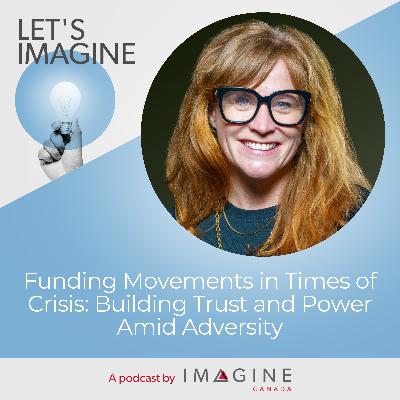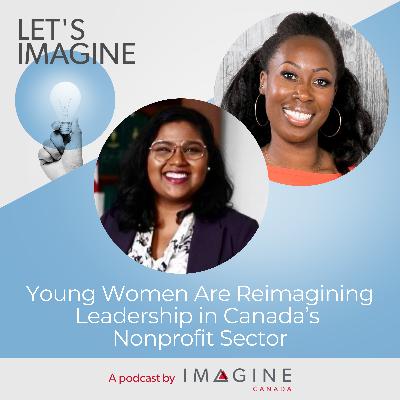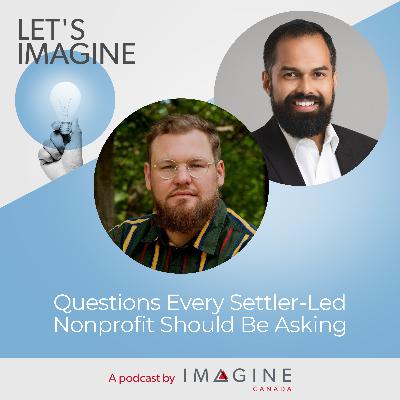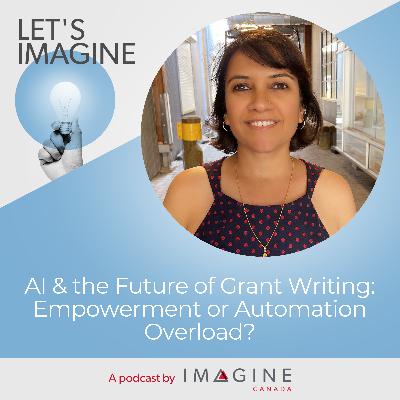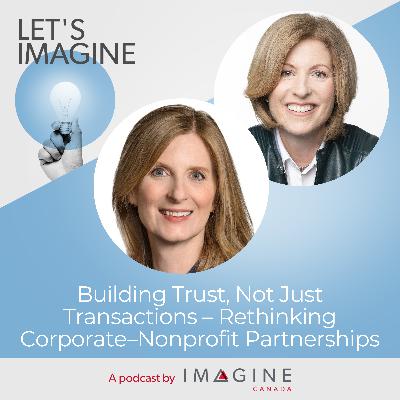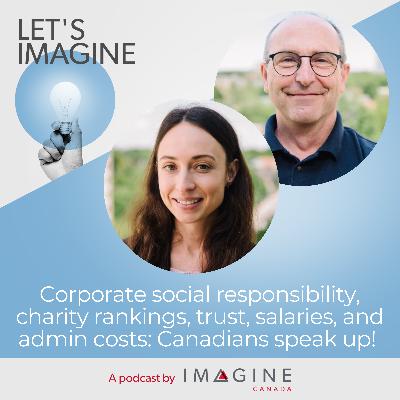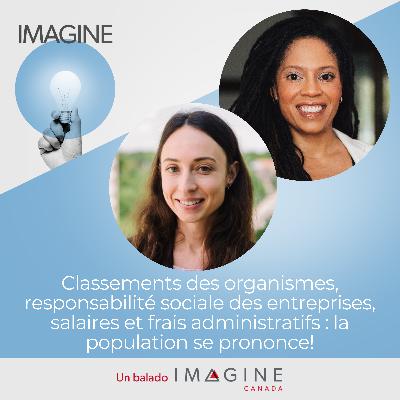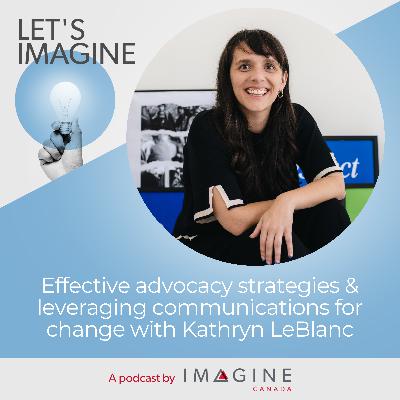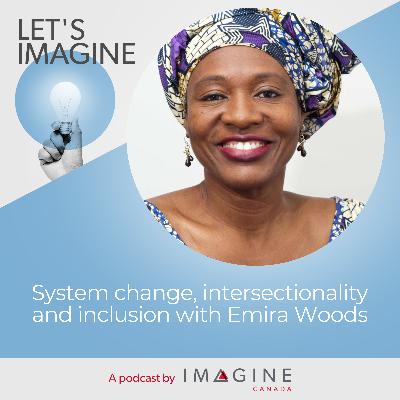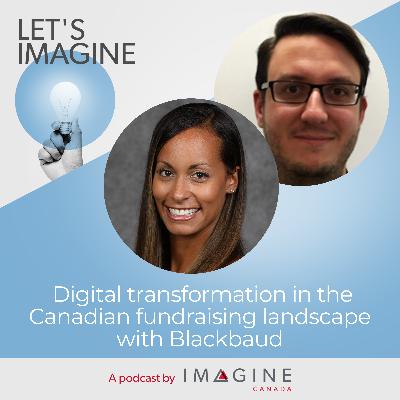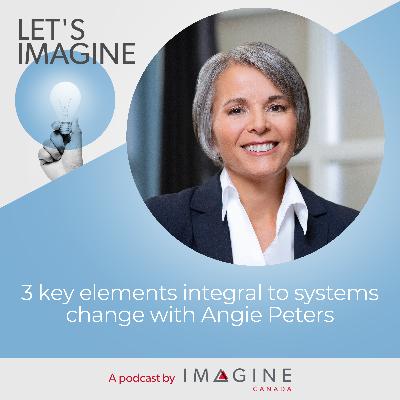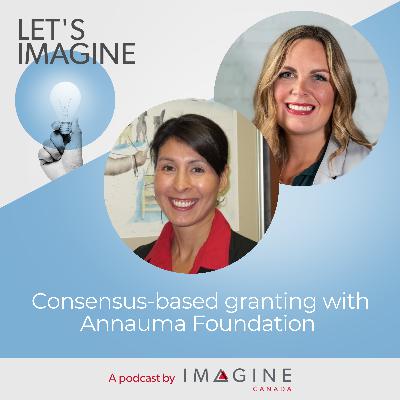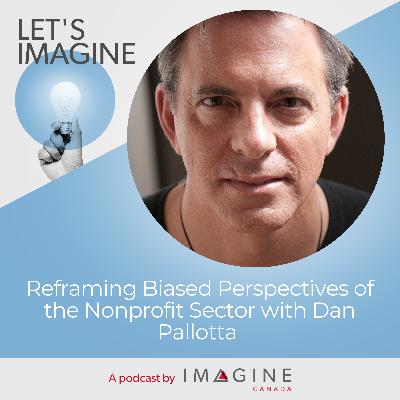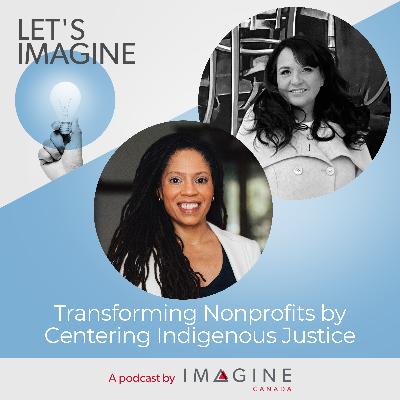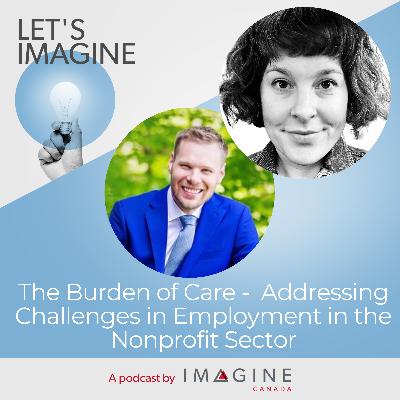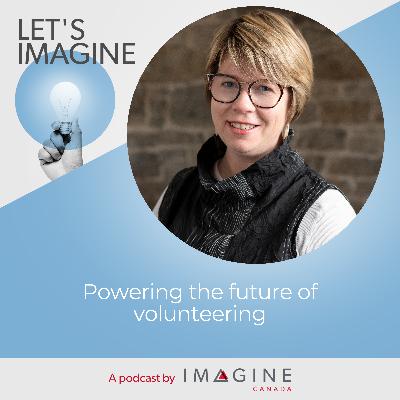Discover Let's Imagine
Let's Imagine

Let's Imagine
Author: Imagine Canada
Subscribed: 8Played: 80Subscribe
Share
© 2023
Description
'Let's Imagine' is a podcast series that invites listeners to explore topics and issues that matter to those who care about the nonprofit sector. Listen in as we explore a diverse range of topics such as policy priorities, decent work, social finance, the rise of trust-based philanthropy and more. Join us, and together, Let's Imagine a stronger future.
40 Episodes
Reverse
In this episode of Let's Imagine, host Bruce MacDonald speaks with Jess Tomlin, CEO of the Equality Fund, about reimagining how philanthropy can truly meet the urgency of our times. From rising authoritarianism and economic instability to shrinking civic spaces, climate emergencies, and entrenched social injustices, nonprofits and human rights movements are navigating unprecedented challenges. Too often, traditional funding models fall short—delivering short-term, restrictive support when what movements need most is trust, flexibility, and long-term commitment. The Equality Fund offers a bold alternative. As one of the world's largest organizations advancing human rights and justice, it is reshaping philanthropy by channeling resources and decision-making power directly to the communities leading change on the ground. Central to this vision is a commitment to long-term funding cycles—spanning 10 years, and even aiming toward generational grant cycles—so that movements can build resilience, shift power, and create lasting impact. For funders and nonprofit leaders alike, this episode is both a challenge and an invitation: to imagine a world where philanthropy doesn't just respond to crisis, but actively builds the conditions for justice across generations. Make sure to check out our full episode list (https://imaginecanada.ca/en/lets-imagine-podcast). This episode is also available on Apple Podcasts, Spotify, and YouTube. Read the full transcript here: https://share.descript.com/view/fqbXgrblqA8
In this special International Day of the Girl episode of Let's Imagine, host Bruce MacDonald sits down with two trailblazers who are reshaping what leadership looks like in Canada's nonprofit sector: Anjum Sultana, Director of Policy Advocacy, Partnerships, and Youth Leadership at Plan International Canada, and Emma Asiedu-Akrofi, CEO of FORA Network for Change. Women represent 77% of the nonprofit workforce, and young people make up 32%. Yet many of the structures and norms that govern the sector were not designed with young leaders in mind. From rigid hierarchies to outdated governance models, barriers still stand in the way of young women, girls, and gender-diverse youth who want to lead. In this episode, we explore what meaningful youth leadership looks like, how funders can better support youth-led initiatives, how youth advisory councils can be powerful vehicles for shifting decision-making, and what systemic changes are needed to share power equitably. They also share personal reflections on their journeys, the barriers they've faced, and the hope they carry for a future shaped by the next generation of changemakers. For nonprofits, this conversation is a call to action: if you say you value youth leadership, how are you proving it? Make sure to check out our full episode list. This episode is also available on Apple Podcasts, Spotify, and YouTube. This podcast was made possible thanks to generous support from our sponsors. SUPPORTING PARTNER Knowledge partner: Carters Read the full transcript here: https://share.descript.com/view/DLB5LW5yGBb Listen to past episodes here: https://imaginecanada.ca/en/lets-imagine-podcast
In this episode of Let's Imagine, host Bruce MacDonald is joined by two powerful voices challenging settler-led organizations to move beyond symbolic gestures: Justin Wiebe of Mastercard Foundation and Alejandro Mayoral Banos of Indigenous Friends Association and Access Now. As the National Day for Truth and Reconciliation approaches on September 30, many nonprofits are preparing statements, hosting events, or pausing operations. While well-intentioned, these actions alone do not constitute reconciliation. Justin and Alejandro call on the sector to dig deeper — rethinking colonial frameworks, building genuine relationships, and taking uncomfortable but necessary steps toward meaningful change. Together, they explore the critical questions settler-led organizations must ask themselves: who holds power in their organizations? Why, as a settler-led organization, are you interested in reconciliation? And who is it for? Importantly, they remind us that systems change is not only visionary — it is practical. It shows up in the day-to-day decisions about hiring and governance, in how funding is distributed, in the metrics organizations use to measure success, and in whether power is being shifted or merely symbolically acknowledged. Real transformation is built from these practical shifts, sustained over time. This episode is an invitation for nonprofits — especially those in settler-led spaces — to act with humility, accountability, and courage. Real reconciliation requires more than a statement; it requires transformation. Make sure to check out our full episode list. This episode is also available on Apple Podcasts, Spotify, and YouTube. This podcast was made possible thanks to generous support from our sponsors. Read the full trancscript here
In this episode of Let's Imagine, host Bruce MacDonald welcomes Deepa Chaudhary — founder of GrantOrb, an AI-powered grant writing platform designed to support nonprofits in one of their most time-consuming and mission-critical activities: securing funding. As artificial intelligence continues to reshape the workplace, its role in the nonprofit sector is evolving rapidly — especially in fundraising and grant development. Deepa shares how AI technology can reduce the burden on overstretched teams and increase access to high-quality funding proposals, particularly for small and medium-sized organizations. Together, Bruce and Deepa explore the promise and pitfalls of AI in grant writing, from questions of trust and authenticity to equity, bias, and environmental sustainability. Join them as they unpack the tools, tensions, and opportunities at the intersection of technology and social impact — and consider what a thoughtful, human-centered approach to AI adoption might look like in the nonprofit sector. If your organization is looking for ways to secure more funding, you may also be interested in exploring Grant Connect (https://imaginecanada.ca/en/grantconnect), Imagine Canada's fundraising research platform, to help you find grant opportunities and grow your impact. Read the full transcript here (https://share.descript.com/view/foKJ7lzA7Ul) ÉPISODE 32 : Intelligence artificielle et demandes de subvention : plus d'autonomie ou surchage d'automatisation? Dans cet épisode du Balado Imagine, nous accueillons Deepa Chaudhary — fondatrice de GrantOrb, une plateforme de rédaction de demandes de subvention propulsée par l'IA. Conçue pour soutenir les organismes à but non lucratif, cette solution les aide dans l'une de leurs tâches les plus essentielles à leur mission : obtenir du financement. Alors que l'intelligence artificielle continue de transformer les milieux de travail, son rôle dans le secteur à but non lucratif évolue rapidement — particulièrement en ce qui concerne la collecte de fonds et la préparation de demandes de subventions. Deepa partage comment les technologies IA peuvent réduire le fardeau des équipes surchargées et augmenter leur accès à des demandes de financement de haute qualité, particulièrement pour les organismes de petite et moyenne taille. Bruce et Deepa discutent également des promesses et des pièges de l'IA dans la rédaction de demandes de subvention, notamment en ce qui attrait à la confiance et l'authenticité, l'équité, les biais et à la durabilité environnementale. Au couer de cette discussion est l'analyse des outils, des tensions et des opportunités à l'intersection de la technologie et de l'impact social — et ce à quoi pourrait ressembler une approche réfléchie et centrée sur l'humain de l'adoption de l'IA dans le secteur à but non lucratif. Si votre organisme cherche de nouvelles façons d'obtenir du financement et accroître votre impact, Connexion subvention (https://imaginecanada.ca/fr/connexionsubvention), la plateforme de recherche de subventions d'Imagine Canada, pourrait vous intéresser.
In this episode of Let's Imagine, we welcome Maria Rio — fundraising professional, sector advocate, and host of the Small Nonprofit podcast. With over a decade of experience and lived experience as a former service user, Maria brings a deep understanding of how equity and community can transform traditional fundraising models. Maria is a strong advocate for Community-Centric Fundraising — a growing movement that reimagines fundraising by placing relationships, equity, and community at the heart of the practice. She has spent the past several years applying these principles to help nonprofits shift from transactional approaches to more authentic, mission-aligned fundraising strategies. Join us as we discuss how fundraisers and nonprofit leaders can redefine donor relationships, center community voices, and build trust-based fundraising practices — even within resource-constrained environments. We also explore how storytelling, advocacy, and systems thinking intersect with equitable fundraising. This episode offers practical insights and inspiring examples for those looking to advance justice and deepen community connection through their fundraising work. Read the full transcript here Listen to past episodes here
In this powerful new episode of Let's Imagine, host Bruce MacDonald welcomes Eden Fineday — award-winning nêhiyaw (Cree) journalist, changemaker, and Publisher of IndigiNews. Eden leads IndigiNews through a lens of cultural safety and actively works to decolonize journalistic practices. She is also the founder and CEO of tâpwêwin media, an Indigenous-led nonprofit that acquired IndigiNews in 2025, and co-founder of the Indigenous Media Association of Canada. Eden recently contributed a series of articles to Imagine Canada's HR Intervals, helping nonprofits better navigate complex people management issues with a focus on equity, reconciliation, and anti-racism. Her work challenges organizations to move beyond surface-level inclusion toward building genuinely safe, culturally grounded workplaces. Join Bruce and Eden as they explore how nonprofits can rethink power, hiring, and leadership to foster deeper cultural safety for Indigenous, Black, and racialized staff. Read Eden's articles on HR Intervals here: Supporting BIPOC Board Members, Staff And Management De-colonizing hiring practices Building Cultural Competency and Cultural Safety Read the full transcript here.
In this episode of Let's Imagine, host Bruce MacDonald sits down with Andrea Barrack, SVP, Sustainability & Impact at RBC, and Claudia Hepburn, CEO of Windmill Microlending—a charity that helps skilled immigrants and refugees leverage their talents and build successful careers in Canada. Together, they unpack the evolving relationship between companies and nonprofits, exploring how authentic partnerships—rooted in trust, flexibility, and shared purpose—can drive meaningful community impact. Andrea offers an inside look at RBC's approach to community investment, including its strategic focus on seeding, scaling, and sustaining community-led solutions. Claudia shares how Windmill's work is transforming lives and what RBC's recent $5 million donation—their largest corporate gift—means for the future of skilled newcomers in Canada's healthcare system. Drawing on key findings from the Bridging Perspectives - Nonprofit Views of Corporate Social Impact in Canada report published by Imagine Canada's PRISM, this episode challenges the idea that dollars alone make the difference. Instead, it highlights how long-term relationships, non-cash support, and a deep understanding of nonprofit needs are what truly enable lasting social change. Make sure to check out our full episode list. Read the full transcript here
For this week's episode of Let's Imagine, host Bruce MacDonald is joined by Émilie Pontbriand, Senior Manager of Strategic Communications at Imagine Canada. Together they review and highlight some revealing findings from a series of public opinion polls Imagine Canada conducted in the past year, thanks to the generous support of BMO. Each poll focused on a theme or topic related to the nonprofit and philanthropic sector, with the objective of collecting data that would shed light on where Canadians stand on social issues as well as their understanding of the work of charities and nonprofits, and perceptions about the nonprofit sector. Listen & share! To learn more about the survey results, we encourage you to also read these summary blog posts: Giving intentions, charity rankings and trust: insights from our latest public opinion poll (February 2025) New poll provides insights into Canadians' views of companies' social responsibility (November 2024) Recent public polling offers insights into long-held perspectives about the sector (August 2024) Read the full transcript here Listen to past episodes here
Pour cet épisode spécial du balado Imagine, Mélanie Valcin, membre de notre conseil d'administration et présidente directrice-générale de l'organisme Littératie ensemble, se joint à nous pour examiner en profondeur certains résultats révélateurs d'une série de sondages d'opinion publique réalisés au cours de la dernière année grâce au généreux soutien de BMO. Chaque sondage portait sur un sujet ou un thème concernant le secteur à but non lucratif ou de la philanthropie et visait à recueillir des données qui nous permettraient de comprendre ce que la population pense des enjeux sociaux, ce que les gens savent au sujet du travail des organismes de bienfaisance et des OBNL et ce qu'ils pensent de notre secteur. Dans cet épisode, nous explorons quelques-uns des points saillants de ces sondages - écoutez et partagez! Consultez aussi nos articles de blogue sur les sondages pour en savoir davantage: Intentions de dons, classements des organismes de bienfaisance et confiance : résultats de notre dernier sondage d'opinion publique (février 2025) Que pense la population de la responsabilité sociale des entreprises? (novembre 2024) Un récent sondage fait le point sur des idées préconçues à propos du secteur des OBNL (août 2024) Lire la transcription complète ici
Dans cet épisode d'Imagine, nous recevons Céline Füri, directrice des politiques et campagnes à Oxfam-Québec. En cette période marquée par les bouleversements et les changements politiques et sociaux, nous discutons de l'importance pour les OBNL de se faire entendre en employant des stratégies de communications et de plaidoyer efficaces. Nous abordons les relations gouvernementales, les communications avec le grand public, qui sont devenues plus complexes, et le pouvoir d'unir ses forces pour provoquer le changement. Écoutez et partagez! Découvrez aussi tous les épisodes de notre balado. Lire la transcription complète ici Impactful Communication and Advocacy Strategies with Céline Füri In this episode of Let's Imagine, we welcome Céline Füri, Director of Policy and Campaigns at Oxfam-Québec. In this time of social and political uncertainty and change, we discuss the importance for nonprofit organizations to make their voices heard by employing effective communications and advocacy strategies. We dive into government relations, communications with the general public, which have become more complex, and the power of joining forces to bring about change. This episode of Let's Imagine was recorded in French.
With rising political uncertainty, misinformation, and growing polarization, advocating for change can feel more challenging than ever. How can nonprofits engage in advocacy responsibly and ensure their voices are heard? In this episode, Kathryn LeBlanc, social impact communications expert and Principal Consultant at LeBlanc & Co Communications, joins us to discuss how nonprofits can leverage communications to accelerate social change. From relying on trusted sources when navigating election-year advocacy to crafting clear, values-based messaging, Kathryn shares tried-and-true insights on how organizations of all sizes can build compelling campaigns that resonate with both decision-makers and the public. Read the full transcript here Listen to past episodes here
In 2020, the world experienced a seismic jolt of awareness related to issues of systemic racism in the aftermath of the murder of George Floyd. From global protests to bold declarations by the leaders of governments, companies and nonprofits, there was a deep desire to do better. Four year later, how are things progressing? In this episode, Emira Woods, Executive Director of Green Leadership Trust based in Washington, DC, shares her perspectives as well as insights and learnings from her work. A great example of inclusion in action, Green Leadership Trust is working to build a thriving environmental and conservation community in the United States, with a vision to embed an environmental ethic and shifting practices and behaviors across sectors and institutions. Read the full transcript here Listen to past episodes here
Nonprofit organizations have had to navigate a lot of change in recent years—shaping the sector toward increasingly digital experiences and processes. Based on these needs, Blackbaud compiled the results of their annual The Status of Canadian Fundraising survey into a comprehensive benchmark report on how Canadian charities and nonprofits are faring in the current fundraising climate. Tanya Turschic, Customer Success Manager, and Phil Hunt, Senior Demand Generation Marketing Manager at Blackbaud, join us in this episode to discuss key findings from their latest in-depth survey. They share insights into fundraising trends, digital maturity, and how nonprofits can embrace tech advancements to drive greater impact. Read the full transcript here Listen to past episodes here
Joining us in this episode of Let's Imagine is nonprofit leader and author Angie Peters. Together we explore Angie's experiences and learnings from working in the poverty reduction space as the CEO of the Toronto-based charity Yonge Street Mission, as a social service provider tackling poverty in the city, and the 3 key elements integral to her organization's approach to systems: lived experience leadership, cross-sector collaboration and creating shared goals. We also discuss managing time expectations and how to frame these insights in ways that can be applied across missions and causes. Listen to past episodes of the Let's Imagine podcast here Read the full transcript here
Community foundations are created to support local community needs, using donated funds from a wide variety of sources. Every community foundation selects their own areas of focus, and how the funds will be invested and distributed within the community. This episode of Let's Imagine features Danielle Gibbie, Executive Director, and Udloriak (Udlu) Hanson, co-founding member of Annauma Community Foundation, the first community foundation in Nunavut. They join us for a conversation on their foundation's origins, the reasoning behind their innovative consensus-based approach to granting and how this is shifting the power dynamics of traditional philanthropy. Listen & share! Don't forget to check out our full episode list. Read the full transcript here
Joining us in this episode is Dan Pallotta, American entrepreneur, author, and humanitarian activist. His experiences with dysfunction in the nonprofit sector have influenced his work, from his viral TED talk to his most recent project, the Uncharitable Movie. Together, we delve into deeply held perceptions about charities, how they are problematic, and how we can reframe the narrative and move forward. We also explore the potential of creative, breakthrough thinking, unburdened by costs & structure, as a powerful tool for real fundamental change in the nonprofit sector. Listen & share! Don't forget to check out our full episode list. Read the full transcript here
Les méthodes et approches éducatives non-autochtones ont contribué à la colonisation des peuples et communautés des Premières Nations, Métis et Inuit. Quelles mesures les organismes à but non lucratif peuvent-ils prendre pour décoloniser les cadres et mettre la justice au centre du dialogue pour les peuples autochtones? Dans cet épisode du balado Imagine, nous acceuillons Mélanie Valcin, présidente et directrice générale, et Krystyna Slawecki, gestionnaire des programmes de Littératie ensemble - un organisme de bienfaisance national qui consacre ses efforts à améliorer la vie des enfants, des jeunes et des adultes grâce à la littératie. Lors de cette discussion, nous abordons la mission de l'organisme et son lien historique avec les communautés autochtones ainsi que leur démarche en ce qui concerne la vérité et la réconciliation. Écoutez et partagez! Découvrez aussi tous les épisodes de notre balado. https://share.descript.com/view/g2qtEW2Tdv2
Non-Indigenous instructional methods and approaches have contributed to the colonization of First Nations, Métis and Inuit peoples and communities. What steps can organizations take to decolonize frameworks and center justice for Indigenous people in the nonprofit sector? In this episode of Let's Imagine, we're joined by Mélanie Valcin, President and CEO, and Kristen Miller, member of the board of directors of United for Literacy - a national charity focused on improving the lives of children, youth and adults through literacy. Together we dive into the organization's mission and its historic relationship with Indigenous communities, as well as their approach to truth and reconciliation. Listen & share! Don't forget to check out our full episode list. This episode is also available on Apple Podcasts, Spotify, and YouTube. Read the full transcript here
In a study from the Environics Institute, Future Skills Centre, and Diversity Institute, findings showed that nonprofit sector workers are less satisfied with their jobs than workers in either the public or private sectors. This dissatisfaction is exacerbated by lower salaries, precarious employment, and part-time contracts - just a few of the challenges facing today's sector workers. Joining us on this episode are Laura McDonough, Associate Director, Insights & Knowledge Mobilization at the Future Skills Centre, and Steven Ayer, President and Founder of Common Good Strategies, and the author of the report. Together, we further explore the findings of the report and discuss the solutions to improving the situations of nonprofit workers. Listen & share! Don't forget to check out our full episode list. This episode is also available on Apple Podcasts, Spotify, and YouTube. Looking for HR resources? Visit HRIntervals.ca to learn more about Decent Work practices and access free resources created specifically for nonprofit organizations. Read the full transcript here
Two major interconnected challenges the nonprofit and charitable sector is facing today are changes to the way volunteerism is working - a shift from formal to informal and the lack of data to inform program design and decision-making to improve the work of organizations in serving our communities. With our guest Megan Conway, President & CEO of Volunteer Canada, we discussed two major initiatives led by Volunteer Canada that aim to help address these challenges: the National Volunteer Action Strategy for Canada and the Canadian Knowledge Hub for Giving and Volunteering. Listen & share! Don't forget to check out our full episode list. Read the full transcript here


